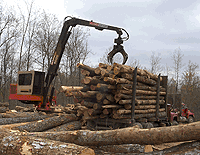New Ky Forest Conservation Act Will Require Trained Loggers
New Ky Forest Conservation Act Will Require Trained Loggers

Kentucky landowners planning to harvest timber after July 15 should use a trained logger to insure they are using the proper best management practices to help avoid water pollution problems.
To comply with the Kentucky Forest Conservation Act, the Kentucky Forest Conservation Act states that, as of July 15, 2000, commercial logging operations must have a master logger on site and in charge. These loggers must use best management practices or BMP's in their logging operations.
Instructors in the Kentucky Master Logger Program are busy trying to insure there are enough trained personnel available to properly operate under the new guidelines.
"About 3,000 loggers have already passed through the training program and we have about 500 additional requests for training," said Jeff Stringer, director of the Kentucky Master Logger Program and Extension Silvaculture specialist in the University of Kentucky College of Agriculture.
"Those who will be taking the training this fall will be issued a letter signifying their intent to complete their training later this year," added Stringer. "That letter should be carried with them until they graduate from the program. It is extremely important to understand that they still could be cited for improper harvesting practices if best management practices are not used."
Although the new laws are directed towards loggers, the landowner should allow the logger to complete the best management practices required to harvest timber on that specific site.
"It is critical for landowners to know that they will held responsible for any water pollution problems," said Stringer. "One of the quickest ways to get into trouble is to not allow the master loggers to implement the appropriate BMPs."
Landowners are urged to take three important steps to insure their timber is correctly harvested.
"First, we urge the landowner to contact a professional forester to help them with the timber sale," said Stringer. "Then they should make sure the logger they have chosen is a Kentucky Master Logger graduate and finally, they should urge and support that the logger to use the correct BMP's for their site."
The workshops teach safety and management techniques that protect the logger, the young trees left for future forests and the entire forest environment.
It is estimated that about 75 percent of all the timber being harvested in the state is cut by loggers who have gone through the three-day training course. The plan is to have all of them trained within a reasonable amount of time.
The program is a partnership among the University of Kentucky Cooperative Extension Service, the Kentucky Division of Forestry, the Kentucky Forest Industries Association and is supported by the Kentucky Division of Water.
"We stress a variety of best management practices that are basically common sense measures used to reduce water pollution and protect the soil from eroding," noted Stringer.
"These practices include leaving some trees around streams, installing water bars on roads to divert run-off, re-seeding retired roads and log beds and keeping treetops out of streams."
Recent landowner surveys suggest that hiring a trained loggers pays off. Landowners had an 80 percent approval rating for work done by master loggers while the approval rating dropped to around 40 percent for untrained harvesters.
"We can produce good quality timber and keep the water clean, but it will take a concerted effort between landowners and trained loggers to insure that our environment is protected," added Stringer.
